Posts: 4,514
Threads: 31
Joined: Nov 2016
(July 17th, 2023, 12:19)greenline Wrote: Bing offered open borders - I don't think we have a trade connection, and I declined anyway. I don't think it is worthwhile to give him that boost, especially when we are reaping the nice benefits of the boosted domestic routes that no one else has.
There will be a trade symbol on the scoreboard if you have a connection to his capital. Open borders might be worth it to establish trust, but I think it's right to deny here.
(July 17th, 2023, 12:19)greenline Wrote: 6 turns to finish Mathematics at 100%, and more for Currency. Is that typical for this stage of the game?
Time to tech at 100% is mostly about how much total commerce you can push through and thus heavily influenced by costs; time at breakeven is more telling. Still, I think our economy is in surprisingly good shape for this stage of the game.
One minor complaint: You keep cropping out the upper right part of the window, which makes it hard to tell what turn we're at.
Posts: 1,952
Threads: 18
Joined: Dec 2014
Sorry about the cropping. Let's fix that...
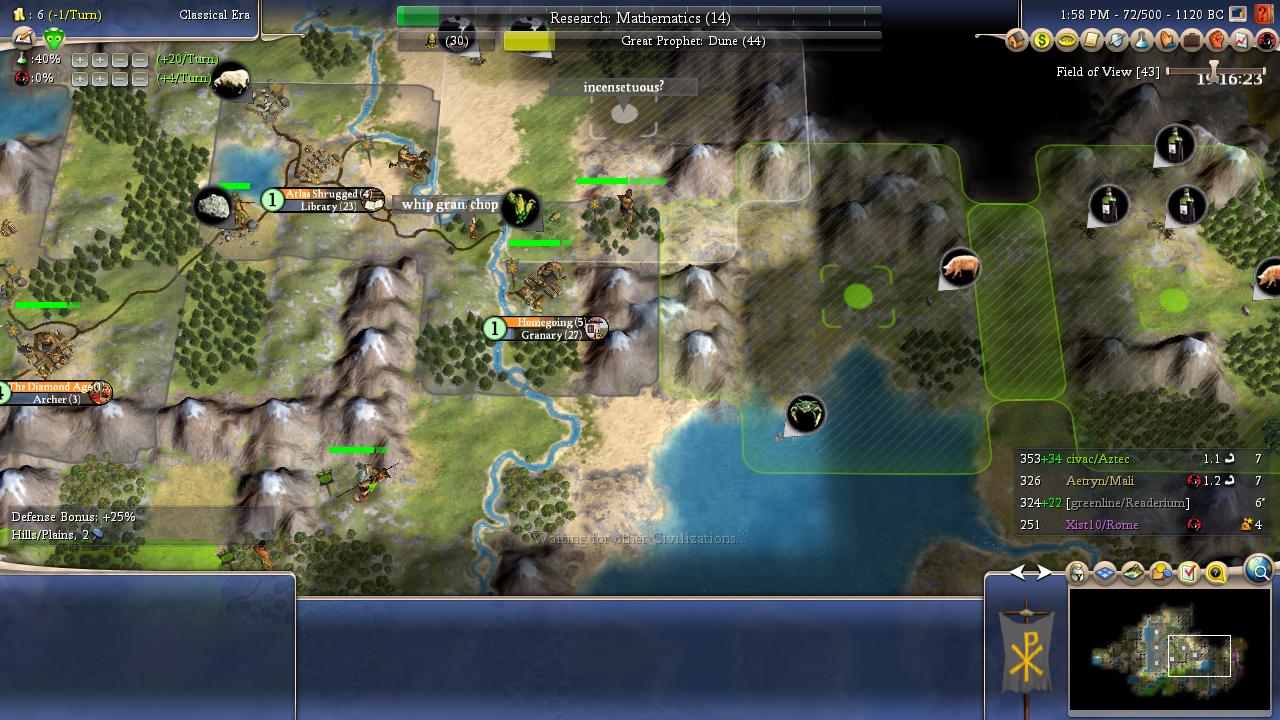
We manage a little below 20 beakers / turn at breakeven (given the -1 gold that will eventually need a turn of savings). Currency is 552 beakers, so that takes around 28 or so turns.
I'm a bit frustrated at how the hillyness of the map and the vertical rivers makes it very slow for us to get our settlers into place. Just getting the pig / crab site will take 3 more turns of roughing it through the hills, with two workers stuck on roading duty. I wonder if the other players are in a similar boat. It seems like the land is a lot more flat where Bing is.
Also, one neat thing that seems to have been added in the BUG mod is the ability to check if a tech has already been researched. One player has grabbed Iron Working, another Sailing, but no one has Currency or Math yet as far as I can tell.
July 17th, 2023, 14:02
(This post was last modified: July 17th, 2023, 14:03 by El Grillo.)
Posts: 2,933
Threads: 12
Joined: Apr 2015
Yeah, BUG mod has the indicator for Known Techs Bonus, which previously could be calculated by selecting each tech and then checking your GNP in the demos screen. It is definitely a nice quality of life feature.
A similar feature, which has not been implemented as far as I know, would be to get a compact view of which techs a player has after you have Alphabet. It is possible to work it out based on the "available to trade" and "available to research" icons but it can take some work.
Posts: 1,952
Threads: 18
Joined: Dec 2014
Bing continues to go hog wild on expansion, taking the cow + clam spot. I'm trying to keep up, but even if I did have the same amount of settlers, I'm running out of city sites that are close by, and have any decent food resources. Grabbing this spot would have meant either roading through eight tiles of hilly foodless wilderness, or having to settle the pig + copper city so that it didn't share the capital wheat. I have the sense Bing's land is a bit more forgiving in that regard. But even so, civac is doing well here, micro wise.
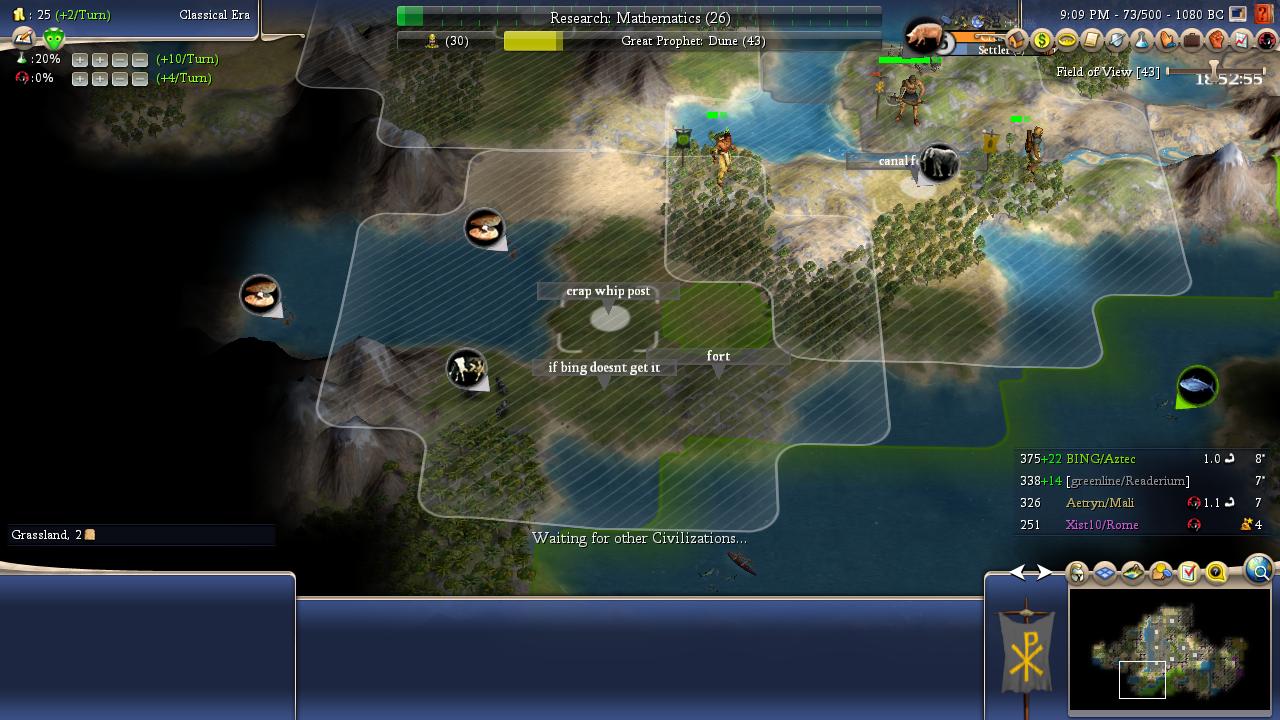
We found a new city on the northern Equinox site. You'll note I moved the city one NE - this will be a stronger site longterm, being on the river and gaining a bunch of riverside tiles instead of tundra. The main tradeoff is that it can't trade the horses and two plains tiles with Dune - but I wasn't planning to work those plains tiles for a while, anyway, and Dune might as well monopolize the horses. I want this city to be a production city, and it will be the Ironworks spot assuming the game goes on that long.
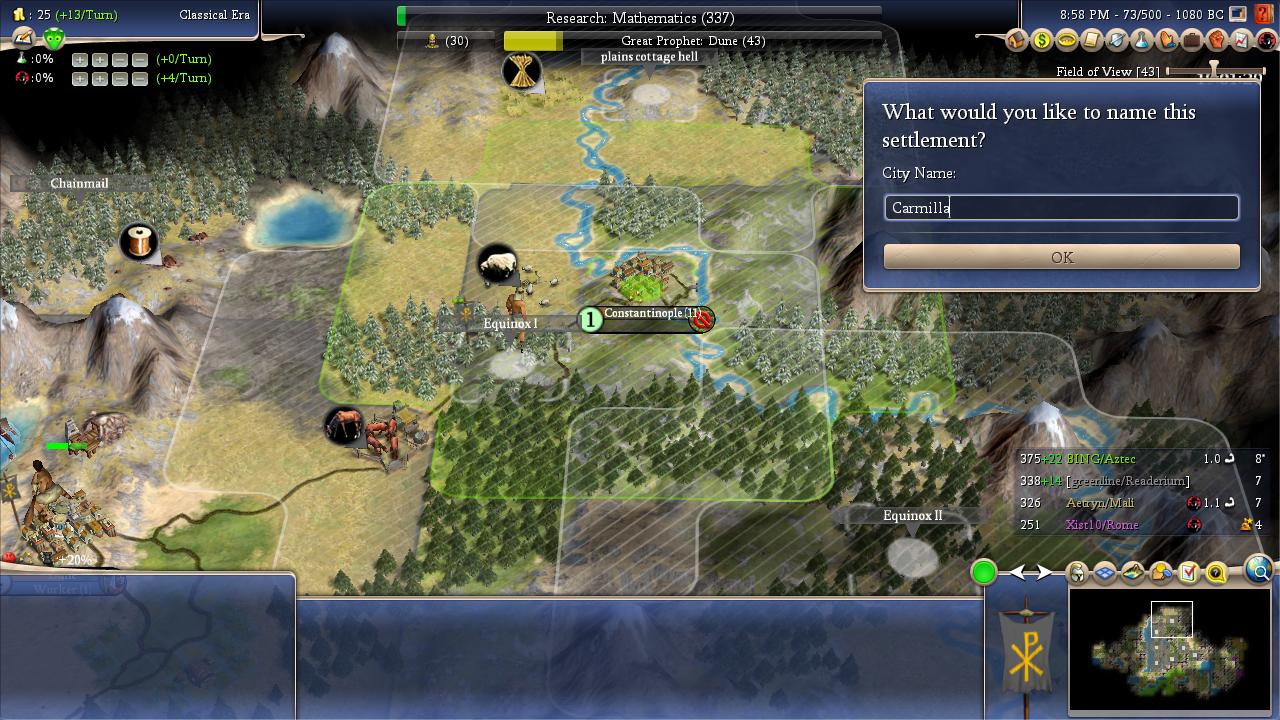 Carmilla
Carmilla is a short novella about vampires written in 1872 - usually, it is rarely mentioned except as an inspiration for the far more popular Dracula. But I think Carmilla is the better story overall.
Where Dracula is a story that bends over backwards for genre conventions of the time, feeling the need to include incredibly dry scenes of London parties before it can be bothered to get to the actual point, Carmilla is succinct. Where Dracula flip flops on whether it wants to be a fantastical horror story or an allegory, Carmilla is just straight allegory - and even works convincingly as a romance novel to boot. It's one of the few romance (or quasi-romance) stories I can stomach, for it captures something you rarely see expressed well in the format: the pains of desire that is not being returned.
The story itself is simple, though enhanced as English writing usually is with a gothic flair. An English family moves to somewhere in Eastern Europe where superstitious peasants warn them about vampires, and then find themselves taking in a strange girl whose mother appears after an unusual carriage accident. This girl is named Carmilla, and she takes a strange interest in the family's daughter, who is of the same age.
Knowing the story is about vampires, one can easily guess that Carmilla is a vampire and seeks to feed upon the daughter, Laura. Where the ambiguity comes in is just how much of this desire is just about needing food and how much of it is a genuine longing for Laura's attention. In the process of Carmilla's stay in the house, she comes across as being tormented by a deep affection for Laura, something that Laura struggles to understand, even as she starts to come down with a strange sickness and have nightmares about feral creatures. Carmilla, of course, can not say why that is happening, but knows it all the same.
In the end, the secret is uncovered and Carmilla is chased away, and eventually staked as she rests in a coffin. There's probably more words than necessary going into the less interesting details of how the vampire mechanically functions - perhaps this was required for audiences who were then unfamiliar with the concept, but it make the end of the book more of a drag.
The obvious reading of the book is that Carmilla is a metaphor for female homosexuality, and how it was understood by a Victorian audience. I think there's some truth to that, but I think the core of the novel goes a little deeper. In some ways, it seems more a reflection on desire itself, and how that can manifest in painful ways when it is not stated or reciprocated. The ways in which Carmilla pursues Laura do not seem unique to female interactions - in some ways they carry a sort of masculine energy, though not in the vulgar manner of today's times. The problem that Carmilla seems to be facing, where she wants to have the affections of someone else, but every step she takes closer to that goal also hurts that other person - that seems even more applicable than just to the particulars of lesbian relationships. And that's what I find most compelling about the book.
Posts: 1,952
Threads: 18
Joined: Dec 2014
T74, taking a moment for a deep breath and reassessing:
First, civac was kind enough to teach me not to spam open diplo windows to check city counts:
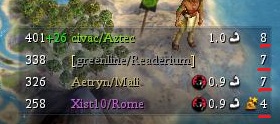
Maybe we ought to add all these BUG improvements into the etiquette thread, if they aren't there already?
So the situation isn't quite as bad as I was thinking in my head - we are tied with Aetryn and one behind Civac. The crop yield gap is more concerning - Civac's cities are all bigger and have more food resources than ours. Granaries can only help close that gap so much.
I think part of this really is the land quality - I see a jungle belt in Bing's territory that just isn't available to us. On a highlands map, jungle means food. But Bing has done a better job settling it quicker.
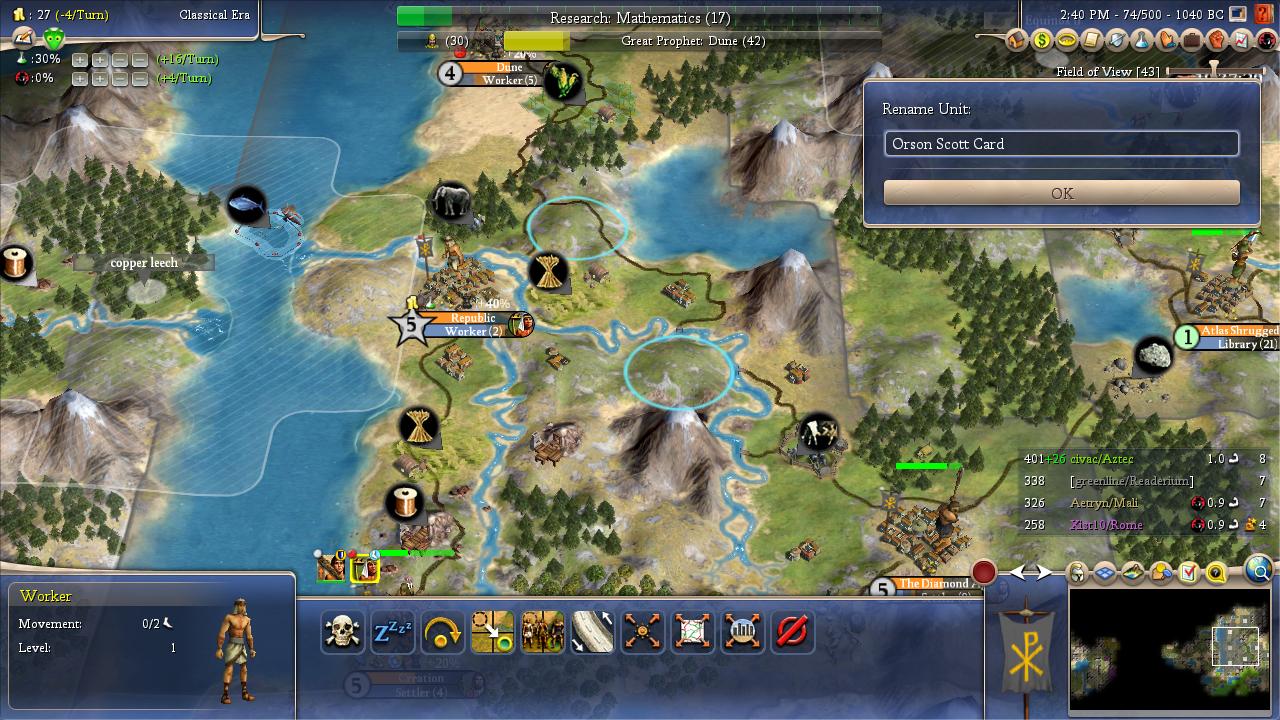
A new worker means a new author to discuss. This one I am pretty sure everyone here has read at some point.
Orson Scott Card wrote Ender's Game, and a whole bunch of sequels in that 'universe', along with a bunch of other fantasy series and fiction I have never been able to get into. But almost everyone nerdy enough to be playing Civ 4 almost twenty years after its release probably knows a lot about Ender's Game. I think it holds up. But what I find more interesting to discuss is where the quality eventually drops in the sequels.
A lot of people still hold Speaker for the Dead in high regard. Despite the very drastic shift in tone and style, it is at least a book designed around a clear and hard hitting message. The pigs really were the ones who killed the researches and stuffed them into trees - but they meant no harm by doing it! And the researches were all too stubborn to make the reasons for this clear in their lab notes.
Speaker for the Dead was clearly heavily inspired by Card's Mormon mission to Brazil. Ender takes on a role similar to an evangelist, coming in from far away to cure domestic ills and spread the good word of the insect queen he keeps in his backpack. I don't dispute that his experience while in Brazil was that the locals were a bunch of hotheaded Catholics, but I think the anthropological focus can't help but take away from the science fiction. There are enough differences between the alien pigmen and the space Brazilians to make it difficult to understand what Card might be saying about real life Amazonian natives and the real life Brazilians on the border of the rainforest. I'm not sure I'd recommend this one.
But I definitely wouldn't recommend Xenocide. I still can barely explain what the hell is going on in that book. Asian computer people send emails to the Star Trek federation about whether they should bomb the super virus while the Catholic kid squad debates theology with the pigmen for half and hour. Nothing is accomplished at all, leaving the next book to explain whether the planet actually gets bombed or not. And that book still doesn't explain what is up with the chemical alien nuts who made the super virus.
Other hot takes about the Ender series welcome.
Posts: 1,952
Threads: 18
Joined: Dec 2014

Shark alert! We have a confirmed Megalodon swimming in the green pool. 
July 19th, 2023, 07:57
(This post was last modified: July 19th, 2023, 07:58 by greenline.)
Posts: 1,952
Threads: 18
Joined: Dec 2014
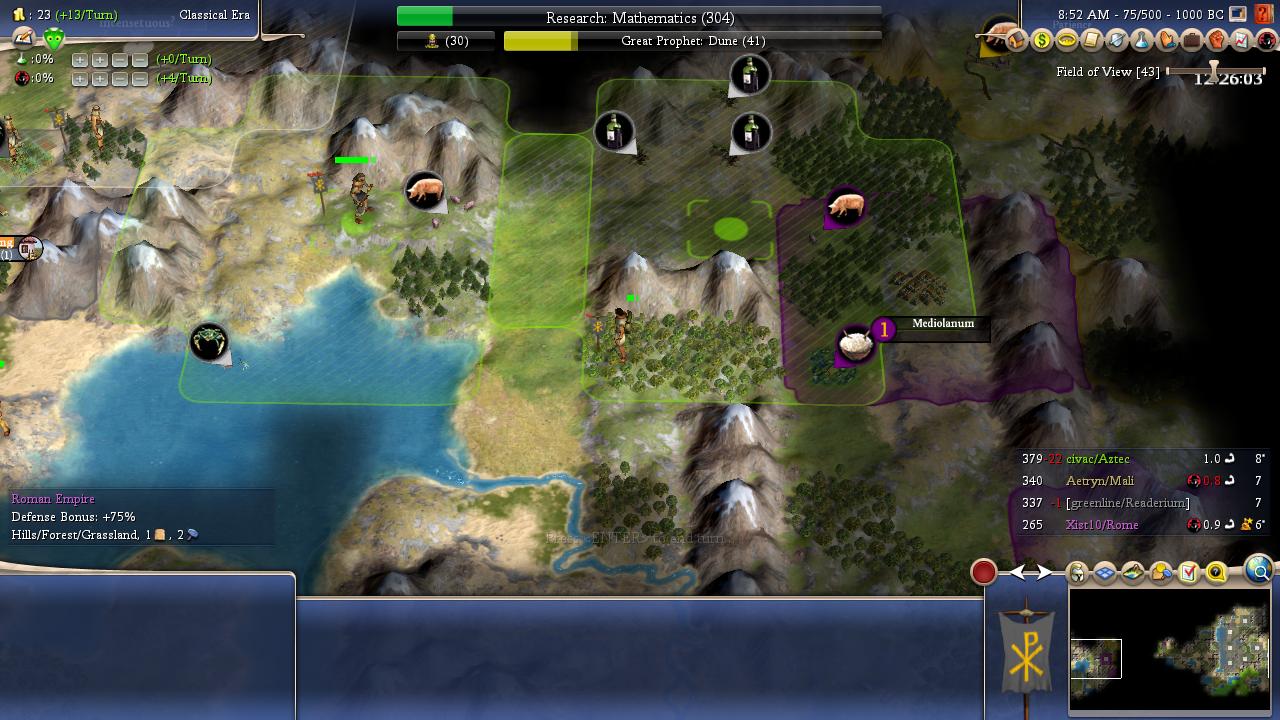
Xist rebounds from 4 to 6 cities, while signing peace with Aetryn. Perhaps I am a bit too hasty to act like he is out of it yet - but in the long term Aetryn is in a good spot for his duel. Will have to consider which way we go forward.
Really makes me wonder what is going on in their side of the world. Will have to wait until the game is over.
Posts: 1,952
Threads: 18
Joined: Dec 2014
We continue our lackluster game of SimCity while the lurkerati chat away about the implications of that war.
Our border fortress in the Xist / Aetryn area is finally settled:
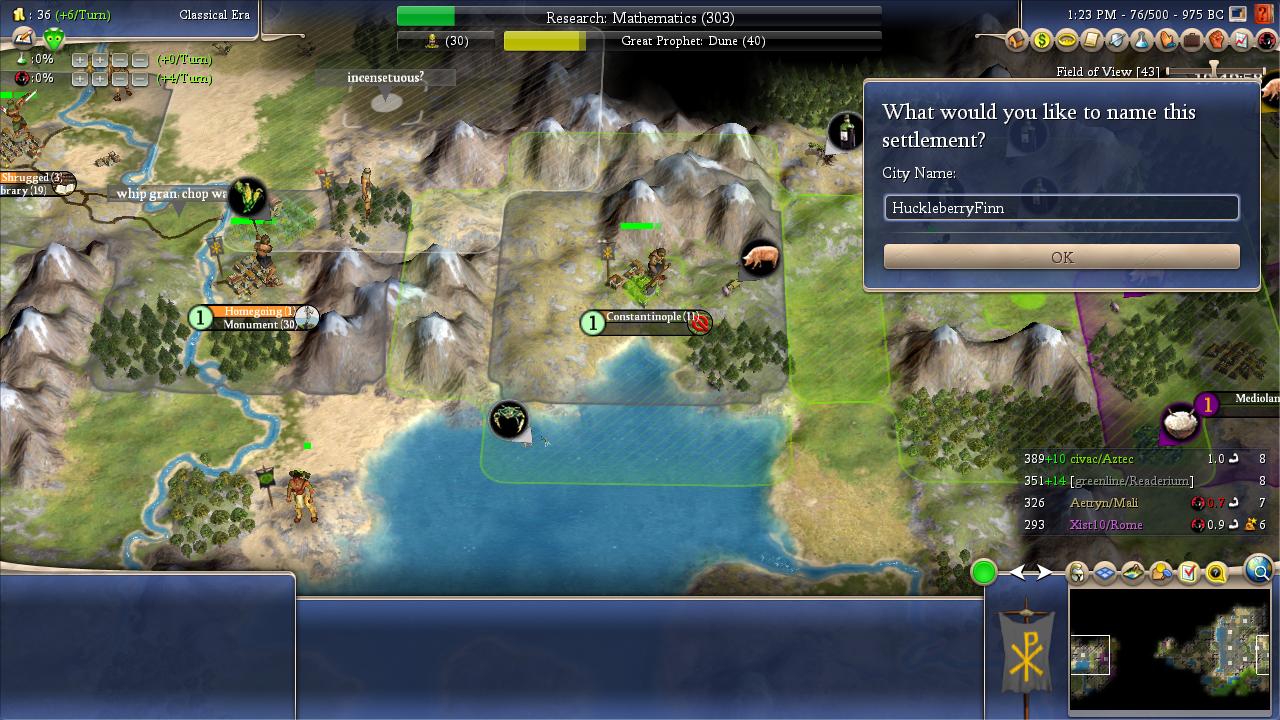
And sadly, it'll take a while for the workers to finish a round through all those hills. It was either that or leave Homegoing hanging without the corn hooked up. Man, am I missing the EXP worker boost from BtS. Next on the menu is more workers from any city that can manage it.
We will likely settle one further city in this direction just to get wines, but the economy can barely afford it at the moment. +6 gold at 0%, and there are still two more cities to settle. One is the other equinox spot, the other is an important canal site (Settler already en route):
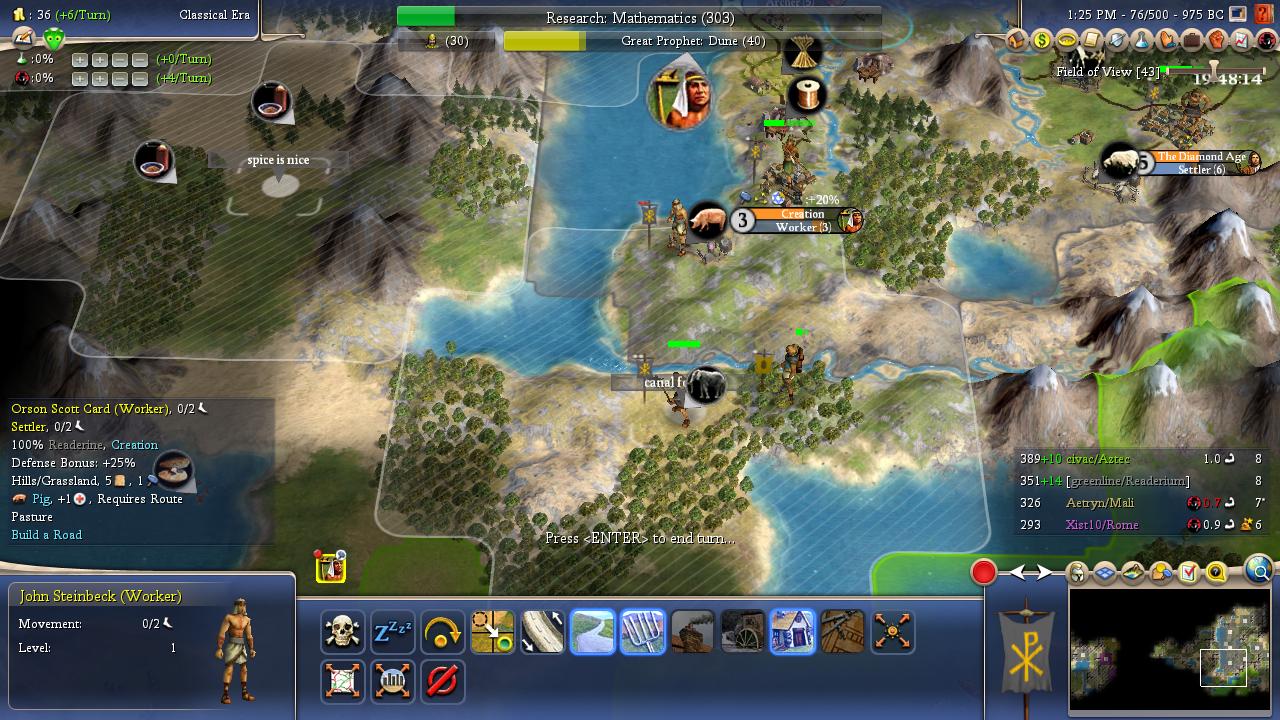
I would have liked to delay grabbing this spot longer, just because of how poor the land is, but Bing settling his own city there forced my hand. I believe we will need this spot to keep long term pressure on Civac, and us being protective does mean it will be a pain for Bing to try and alpha strike raze the city if we can have a bunch of longbows behind walls and a castle there.
Now that our economy is really starting to crater from expansion, I think now is about the time for a civics + religion? revolt. Once the last settler is whipped, I will go ahead and pull the trigger on OR + HR - but I am not sure about throwing a revolt to Judiasm in with that or waiting until the first golden age.
Speaking of golden ages, need to form a plan there to get the first GP faster. Would it be better to stack GP production in Dune since it has the Oracle GPs already, or to do it from scratch in a new city with a library and saving the guaranteed prophet for a shrine? Probably better to just get it going ASAP.
Posts: 1,952
Threads: 18
Joined: Dec 2014
And now for the books:
The Adventures of Huckleberry Finn is a book I would think is actually worthy of the incredibly pretentious title of The Great American Novel. Why is that? It's because Mark Twain, as a writer, knows how to capture the attitudes and folkways of the people who lived on the land. There are a few other American writers who pull this off, and a great many who can't or don't even bother trying. Those authors are hardly worthy of that award.
The book is mostly about the journeys of a child running away from an abusive home in the South - he is joined by a slave and travels down the Mississippi river on a raft. On this journey, they meet all kinds of strange and colorful faces in the American wilderness. Families locked in deadly blood feuds. Hucksters pretending to be French royalty. Thieves and scoundrels of all kinds. The constant threat of angry townsfolk armed with pitchforks and shotguns. But, as negative as all that sounds, it still doesn't seem unflattering. For all the problems of the South, the people there are still shown to be possessing of some vitalist energy that keeps them pushing forward, even in their chaotic daily lives.
This colorful energy includes heavy use of written dialects and vernacular that do take some energy to parse, but are necessary to create an honest picture of life as it was then. Included in this is heavy use of racial slurs. If you want to read this, you have a time limit. Roald Dahl was already hit by the censors, and Twain is most assuredly high on the list of upcoming targets.
I would recommend the book highly for creating a picture of life in the American South, but not for the ending. I am not the first person to notice it, so I will keep my description brief: trying to tie in a heavy handed moral message at the end of your book that has nothing to do with the rest of the story is never going to be a good idea. So many authors keep trying this, but it never works!
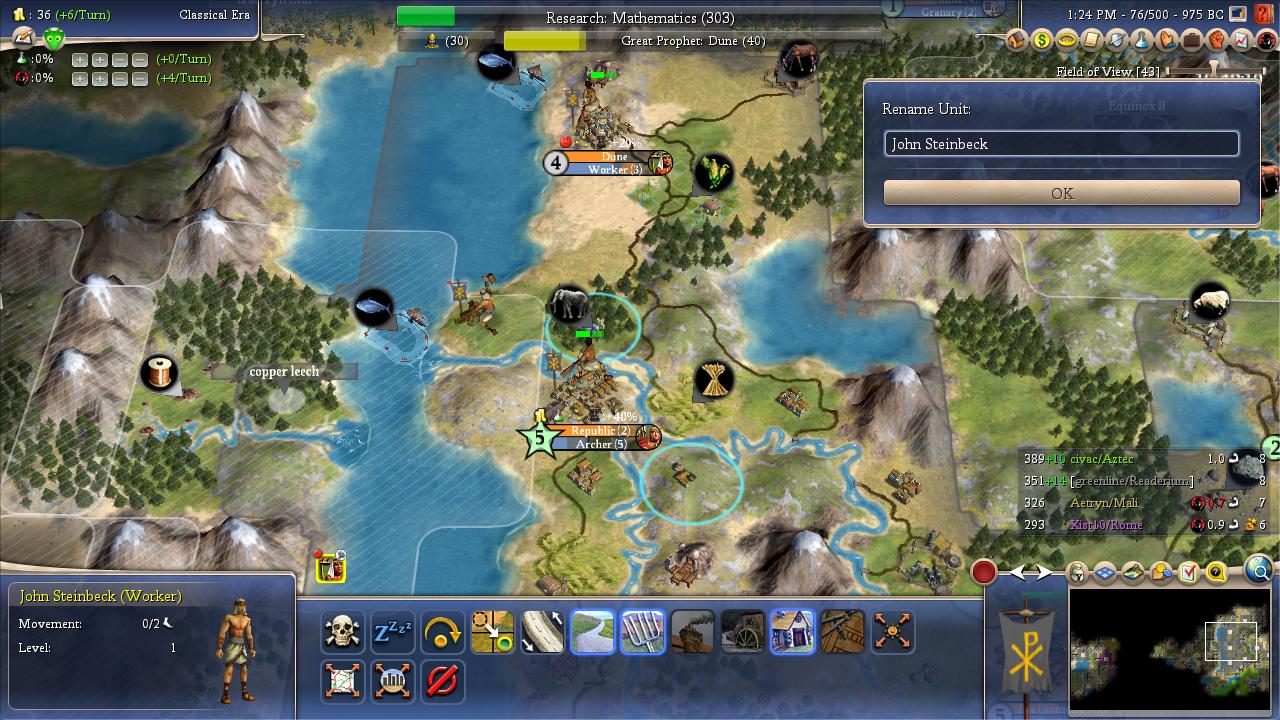
Steinbeck, by contrast, is a man who has only one thing to say and say it he will, with all the breath in his system. A man who wrote most prolifically during the Great Depression, all of his popular works relate to the theme of farmers being pushed off the land. The Dust Bowl and crashing food prices meant that many American farmers found themselves unable to pay taxes or rent on their land, and had to foreclose and head west in search of any sort of sustenance. Many ended up in California, the setting Steinbeck was fond of writing about.
And here his novels often become self defeating.
Of Mice of Men, The Dubious Battle, The Grapes of Wrath all feature migrant workers who arrive in California and find work. The work is not easy or comfortable, certainly not by modern standards - but it is work. The migrants all find adequate food, water, and shelter. Many are capable of saving away their extra earnings for the future. When I read novels about the dark collapse of agriculture, I expect to see people actually starving. Steinbeck's dark vision of the thirties shows an America that has taken a financial beating, but is still fantastically wealthy enough that it is nothing like the great famines of Soviet Russia, or the historical great floods of the Yellow River. And so, when the migrants in the book inevitably settle into a routine where they can work, eat, and save, and then Steinbeck starts talking about the importance of labor organizing... one raises an eyebrow. The eviction of many farmers from the plains seems far more a tragedy than the minimum wage not being set to a quarter an hour instead of a dime.
Thus, I've found his works far less appealing with age.
Posts: 4,514
Threads: 31
Joined: Nov 2016
(July 19th, 2023, 12:36)greenline Wrote: Speaking of golden ages, need to form a plan there to get the first GP faster. Would it be better to stack GP production in Dune since it has the Oracle GPs already, or to do it from scratch in a new city with a library and saving the guaranteed prophet for a shrine? Probably better to just get it going ASAP.
Normally I'd want a shrine for that religion, but on such a small map it won't ever be worth that much. Probably more reward in a fast GA.
|




